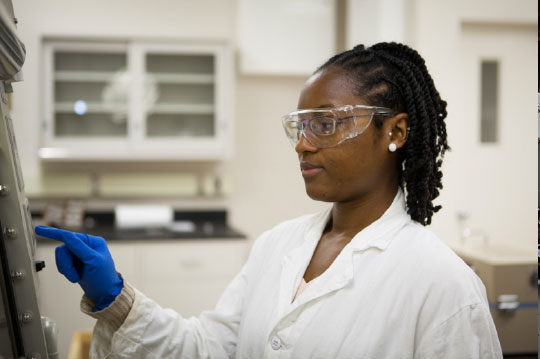Doctoral candidate enriches chemistry knowledge to improve lithium batteries

LaDena A. Bolton begins each day with zeal and ends it with a sigh of relief, at least when her experiments run smoothly. Sometimes her experiments do not go as planned, but she says that is the nature of being a scientist.
“Research is so unpredictable; it’s difficult to define anything as typical,” she said. “My day begins with a checklist of tasks to accomplish, but it is driven by the demand of the research.”
Bolton, a doctoral candidate at Clark Atlanta University pursuing a degree in chemistry, spent her summer at the National Energy Technology Laboratory in Morgantown, WV, analyzing lithium compounds with an end goal of providing safer and more efficient batteries.
She is a participant in the Mickey Leland Energy Fellowship (MLEF) program, which is administered by the Oak Ridge Institute for Science and Education and managed by ORAU for the U.S. Department of Energy. The 10-week summer internship program increases STEM opportunities for minority and female students. All eligible candidates are encouraged to apply for the program.
“I applied to MLEF so I would be exposed to expert training and potential careers,” Bolton explained. “Over the years, minorities and women have been outnumbered in STEM positions within the U.S. government, so participating in MLEF permits me to help reduce this discrepancy. My research project involves the study of how ionic conductivity of solid state lithium electrolytes is affected by preparation techniques and doping agents.”
She is focused on improving the ionic conductivity of the solid electrolyte applied in high performance batteries by testing various lithium based oxides, and she used doping techniques to alter the ionic properties of the material.
“Liquid electrolytes are currently used for lithium-ion batteries because of their high ionic conducting behavior,” she said. “However, the risk of explosion and fire accidents has encouraged researchers to find alternative materials. Solid lithium oxides have shown promise.”
The global market for lithium-ion batteries is expected to double by 2016, a projection that inspires scientists to target the current weaknesses and further improve safeguard tests. The idea is to help prevent the overheating issues that have led to grounding airplanes and fires in consumer electronics.
Bolton learned several new research techniques throughout her participation in the program, including X-ray diffraction and microwave chemistry. She is also deepening her understanding of crystallography, the study of atoms in solids, through her daily analysis of the lithium samples.
“I am learning to transfer my skills across disciplines,” she said. “The experience has provided a standard of excellence that I am using to measure how efficiently I am learning at my home institution, the relevance of what I am learning there and how my university is preparing me intellectually for an R&D career.”
She looks forward to obtaining her doctorate in fall and plans to serve as a science advisor to the Mayor of Atlanta or Governor of Georgia, among other goals. Her ultimate plan, though, is to obtain a permanent position with DOE researching sustainable and renewable energy sources. She finds the MLEF program to be a gateway to success.
“This is not just a temporary research experience for me, it is the determining factor for my livelihood,” she said. “I am using this opportunity as a stepping stone for employment following graduation. For those who are interested in MLEF, this is not ‘cookbook’ chemistry; real discoveries are being made here.”
